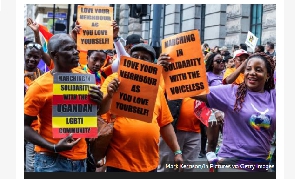 Uganda recently passed one of the harshest anti-homosexuality laws
Uganda recently passed one of the harshest anti-homosexuality laws
A new report has recorded more than 300 human rights abuses against the LGBTQ community by state and non-state actors following the enactment of the anti-homosexuality law in Uganda.
The report was released by a group of rights agencies under the Convening for Equality.
Between January and August 2023 "real and perceived LGBTIQ+ persons were tortured, beaten, arrested, outed and suffered physical, sexual and psychological violence, including forced anal exams, evictions and blackmail, loss of employment and health service disruptions", the groups say.
These accounted for a total of 306 human rights violations and abuses based on sexual orientation and gender identity.
There were 179 incidents of torture, cruel and inhuman treatment that included 18 forced anal examinations ordered by police were documented.
The authors are calling for protection from the international community and an end to the consequences of the anti-gay legislation whose effects they say have gone unaddressed by the authorities.
They note both politicians and religious leaders "catalyse the potential for more violence and discrimination, furthering physical and economic vulnerabilities of LGBTIQ+ Ugandans".
The report also indicates increased mental health cases such as suicidal thoughts, and an upsurge in the number of people seeking asylum.
“As other African countries consider similar laws that not only increase prison time for same-sex sexual conduct but criminalise legitimate human rights and public health work, it is more important than ever for international funders and businesses to actively defend the principles of non-discrimination and inclusive economic development in their words and actions," said Frank Mugisha of Sexual Minorities Uganda and co-convener of Convening for Equality.
It was difficult to give an exhaustive account of the abuses, the report cautioned, as some victims were reluctant to share their ordeals because of fear of retaliation.
When the BBC reached out for comment, Uganda government spokesman Ofwono Opondo said the country has a vibrant civil society and local community FM radios that the activists could have reported the cases to.
He said none of the rights groups had reported a single case since the law was enacted.
"Besides, homosexuality is an undercover life that unless you're really close to a person it's unlikely you would know."
Mr Opondo added that "this is a false concocted report. Come to Uganda and carry out your own deeper investigations than relying on hearsays by people or organisations that are seeking your financial support".
Uganda's President Yoweri Museveni on 26 May signed into law a strict anti-gay bill that includes the death penalty for "aggravated homosexuality", a move that sparked Western condemnation.
Subsequently, the World Bank announced it had suspended all new funding to Uganda saying the new law contradicts its values.